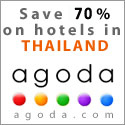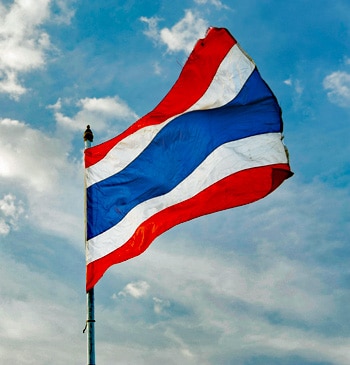
Thai flag
On this page we provide you with information about Thailand. Here you can read the most important facts about Thailand.
Thailand is located in Southeast Asia and borders Malaysia, Cambodia, Myanmar (Burma) and Laos. The Thai name of the country is Prathet Thai, which means 'free land'. Thailand has a varied landscape with forested mountains, rivers, rainforests and areas of dry land. Striking are the large limestone rocks that rise from the Andaman Sea. The majority of the Thai population is Buddhist. The Thai population is also known as a friendly people, which is why the country is also called the 'Land of Smiles'. Thailand is popular with many travelers as a destination for a beach holiday and/or for an (organised) tour.
Thailand is one of the most popular distant holiday destinations for the Dutch. More than 120.000 Dutch tourists visit Thailand every year. Especially the friendly population is one important reason to choose Thailand or go back.
Thailand is not only popular with the Dutch, 30 million people from all over the world visit the 'Land of Smiles' every year'.
The Thailand information on this page has been compiled by the editors of Thailandblog.
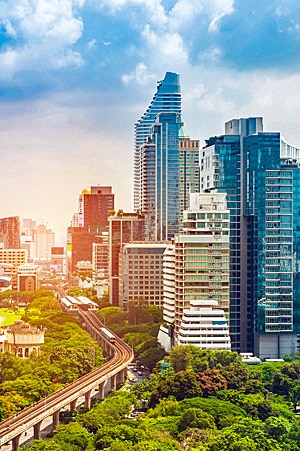
Bangkok
Kingdom of Thailand
- Capital: Bangkok
- Form of Government: Parliamentary Monarchy (Kingdom)
- Head of State: King Rama X, Maha Vajiralongkorn Bodindradebayavarangkun (July 28, 1952 – age 66)
- Head of Government: Prayut Chan-o-cha (March 21, 1954)
Location and Region
Thailand is located in Southeast Asia, bordering the Andaman Sea and the Gulf of Thailand, southeast of Myanmar.
Surface
The total area of Thailand including territorial waters is 513.120 km². This makes Thailand about the size of France. The shape of Thailand is more elongated. The land is shaped like an elephant's head (see Fig map of thailand).
Neighboring countries
Thailand is located between Malaysia (south), Myanmar (formerly Burma; west and north), Laos (north and east) and Cambodia (south-east).
Borders of Thailand
Thailand's borders cover 4.863 km of which:
- 1.800 km with Myanmar
- 803 km with Cambodia
- 1.754 km with Laos
- 506 km with Malaysia
The total coastline is 3.219 km
Map of Thailand
Click here for a detailed: map of thailand
Population
Thailand has 69,5 million inhabitants, of which 75% are Thai, 14% Chinese and 11% other nationalities. Most of the inhabitants live in Bangkok: more than 10 million people.
Language
The official language and working language is Thai. Of the total population, 90% of the population speaks Thai. In the tourist areas people speak poor to reasonable English. Students, the higher educated and the Thai elite speak good English. Furthermore, there are several important ethnic and regional dialects.
In the Northeast of Thailand that is Lao-Thai. Kam muang in the north. In the South 'Phasaa Taai'. In addition, the hill tribes have their own languages. Khmer is spoken here and there in the border area with Cambodia.
Thai is a so-called tonal language (tonal), it has five pitches, namely high, middle (at normal height), low, falling and rising.
Religion
Thailand is a Buddhist country. Buddhism is more a way of life than a religion. Many Thai also believe in good and evil spirits (animism). A minority is Muslim and Christian:
- 94,6% Buddhist
- 4,6% Muslim
- 0,7% Christian
- 0,1% other religion
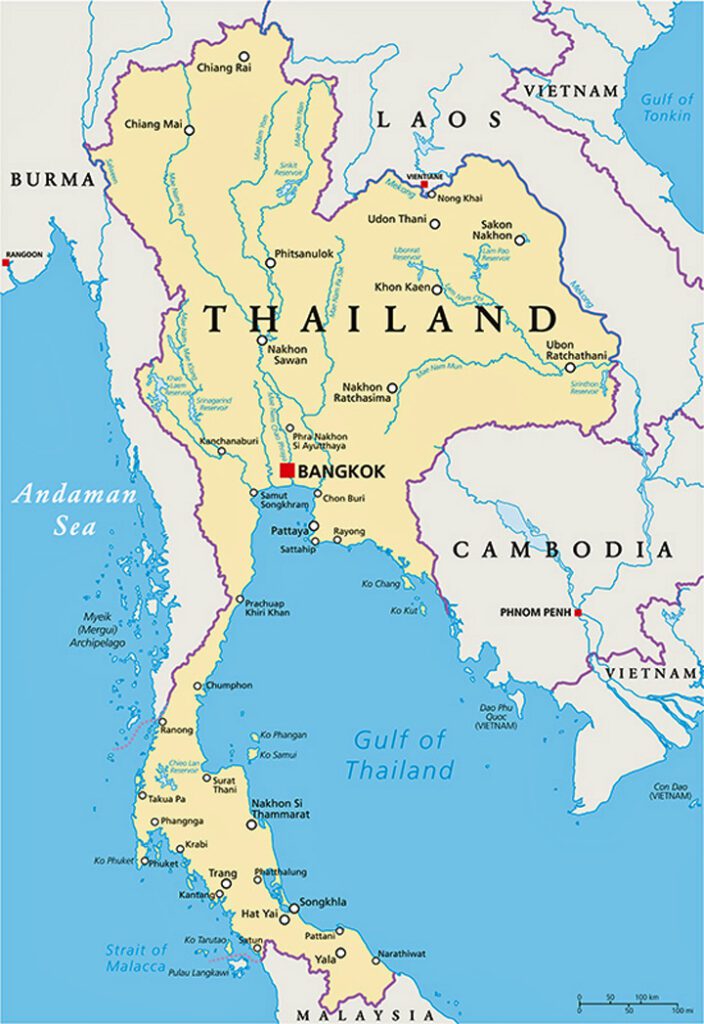 Practical tourist Thailand information
Practical tourist Thailand information
Dutch embassy
The Dutch Embassy is located in the center of Bangkok: address: 15 Soi Tonson, Ploenchit Road, Lumpini, Pathumwan, Bangkok 10330, Thailand.
- Ambassador: Kees Rade
- Telephone +6623095200 (available 24 hours a day, 7 days a week)
- Fax: + 6623095205
- Email: [email protected]
- Opening hours: Monday to Thursday: 8.30:12.00 am – 13.30:16.30 pm and 8.30:11.30 pm – XNUMX:XNUMX pm. Friday: XNUMX am – XNUMX am.
Time difference between Thailand and the Netherlands
Thailand has no summer or winter time. The time difference with the Netherlands is:
- Summer time in the Netherlands, 5 hours later in Thailand
- Winter time in the Netherlands, 6 hours later in Thailand
- Official time zone: GMT +7
Electricity in Thailand
Mains power: 220 volts AC, 50Hz. You can use both flat and round two plugs in Thailand. Electrical appliances (for example a hair dryer, laptop or shaver) normally work on the Thai power grid.
Phone
It is advisable to bring your mobile phone to Thailand. The cheapest thing is to replace your SIM card with a Thai SIM card. These are available at the airport and at most department stores. Calling with the telephone in your hotel room is not recommended. High costs are often charged for this. Read all about internet and calling in Thailand here.
Do you want to call the Netherlands? First dial +31 or +32 and then the area code without 0, followed by the subscriber number.
Tips
Certainly in the hotels and restaurants, all bills are inclusive. If you are satisfied with the service, an amount of approximately 10% is a good suggestion. More about You can read tips in Thailand in this article.
Photography/film/video
Thailand is a true paradise for filming and photographing. The Thai are used to tourists photographing buildings and people; however, always ask permission for close-ups. It is forbidden to photograph military buildings and airports. For flying and filming with a drone a permit is required.
Tap water
It is better not to drink tap water, although the water quality is reasonable. You can brush your teeth with it. Bottled mineral water or 'drinking water' is available everywhere. In your hotel it's free and it's in the fridge in your room.
Clothing
We recommend light, cotton summer clothing and of course swimwear. When visiting a temple, keep in mind that knees and shoulders must be covered.
Passport and visa
A valid passport is required. This must be valid for at least six months upon return. A tourist is allowed to stay in Thailand for 30 days. If you stay in Thailand for more than 30 days, you need a visa. If you need a visa, you can apply for it through the visa office or at the Thai embassy in The Hague, the Thai consulate in Amsterdam or any other Thai embassy in the world. If you enter Thailand by land, for example from Cambodia, Laos or Malaysia, you can stay in Thailand for a maximum of 30 days. Read more here: visa for Thailand. Do you have a question about a visa for Thailand, our visa specialist Ronny can answer your question. take contact without obligation.
Currencies
100 baht is worth about €3,00 (2019). There are plenty of ATMs (ATM) to be found in the tourist areas and you can go to banks and hotels to exchange money. Naturally, the exchange rate of the bank is more favorable than in the hotel. Credit cards are accepted almost everywhere in hotels, restaurants and larger shops. You are allowed to import (maximum USD 10.000) or export (maximum USD 50.000) the Thai currency, the baht.
Official Holidays
Thailand has a number of public holidays. It is useful for tourists to know which ones because government services, large companies and banks are closed on official holidays. Most shops, all shopping malls and almost all tourist attractions are open normally. Also important, on most public holidays, the sale of alcohol is prohibited throughout the day (from 00.00:24.00 to XNUMX:XNUMX).
Official Thai holidays in 2019:
- January 1 (Tuesday) – New Year holiday.
- January 2 – New Year holidays.
- February 19 (Tuesday) – Makha Bucha Day.
- April 6 (Saturday) – Chakri Day.
- April 8 (Monday) – replacement holiday for Chakri Day.
- April 13-15 (Saturday-Monday) – Songkran Thai New Year.
- April 12 (Friday) – Songkran replacement holiday (unconfirmed).
- April 16 (Tuesday) – substitute holiday for Songkran.
- May 1 (Wednesday) – Labor Day.
- May 18 (Saturday) – Visakha Bucha Day.
- May 20 (Monday) – replacement holiday for Visakha Bucha Day.
- July 16 (Tuesday) – Asahna Bucha Day.
- July 28 (Sunday) – Birthday of HM King Maha Vajiralongkorn (Rama X).
- July 29 (Monday) – replacement holiday for HM King Maha Vajiralongkorn's birthday.
- August 12 (Monday) – HM Queen's Day and Mother's Day.
- October 13 (Sunday) – HM King Bhumibol Adulyadej Memorial Day.
- October 14 (Monday) – replacement holiday for HM King Bhumibol Adulyadej Memorial Day.
- October 23 (Wednesday) – Chulalongkorn Day (Rama V Day).
- December 5 (Thursday) – Memorial Day for King Bhumibol and Father's Day.
- December 10 (Tuesday) – Constitution Day.
- December 31 (Tuesday) – New Year's Eve.
If an official holiday falls on a Saturday or Sunday, the next or the preceding working day is celebrated as a national holiday. The government can also designate a day once as a national holiday due to special circumstances.
Netherlands Embassy in Bangkok
The Dutch embassy in Bangkok is also closed during most Thai holidays. Of course, the embassy can be reached for very urgent emergencies, such as a death in Thailand. Look here for an overview: Closing days Dutch Embassy Bangkok »
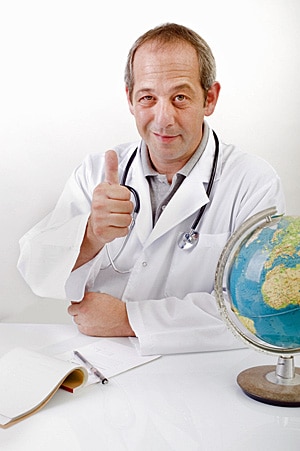 Health information for Thailand
Health information for Thailand
Vaccinations and vaccinations for Thailand
Contact the GGD or your GP in good time, some vaccinations only offer protection after a certain period of time. Recommended vaccinations:
- Vaccination against DTP, which is diphtheria, tetanus and polio.
- Vaccination against typhoid fever for stays longer than 3 months.
- Vaccination against hepatitis A or infectious jaundice.
If you are staying in Thailand for a longer period of time, you can also consider the following vaccinations:
- Vaccination against hepatitis B for a stay of 3 months or more or on the advice of your vaccination office.
- Vaccination against tuberculosis on the advice of your vaccination office.
- High risk of rabies or rabies. Discuss prevention at your vaccination office.
- Japanese Encephalitis occurs in the country. Consult with your vaccination clinic whether vaccination against this is useful.
- There is a risk of the worm infection Bilharzia in contact with natural fresh surface water. Discuss prevention at your vaccination office.
- Protection against mosquito bites during the day is important in connection with dengue disease. Discuss prevention at your vaccination office.
Air pollution
Serious air pollution can occur in major Thai cities. Also in the north and northeast of Thailand, the air quality can be very bad at certain times of the year. For air quality information, please refer to the English language website of the World Air Quality Index. Are you traveling with young children or do you have a respiratory condition? Then consult your doctor before traveling to Thailand.
Health risks in Thailand
There are no particular health risks in Thailand. However, rabies or rabies is more common.
- Malaria occurs in Thailand, but not in the tourist areas. Dengue fever (dengue fever) is becoming more and more common.
- Never drink raw water. Tap water is not drinkable in Thailand. Brushing your teeth with tap water is no problem.
- Stay away from (street) dogs. This in connection with dog bites and the risk of rabies or rabies.
- The food is generally safe and can be eaten anywhere, including on the side of the road.
- There is an increased risk of STD. Always use a condom during sexual contact.
- The medical facilities in Thailand are particularly good, many doctors have been trained in Europe or the US. Sufficient hospitals and well-trained doctors are available, especially in the major cities and tourist areas. The doctors also speak English.
Point to travel in Thailand
Traffic
There are thousands of road deaths in Thailand every year. Often due to a combination of reckless driving and alcohol. The vast majority of victims are motorcycle and moped riders. Often no helmet is worn. For the renting a motorcycle (there are no mopeds in Thailand) a motorcycle license is required. However, this is not always indicated by the landlord. Even if the moped is delivered insured, the insurance does not cover if it has been driven without a driver's license.
To smoke
Thailand has strict anti-smoking laws. For example, it is prohibited to smoke on the beach, at airports, public parks, sports grounds, tourist attractions, zoos, markets, stations, public buildings, cafes, restaurants, public transport and shops. Also the electronic cigarette or E-cigarette is strictly prohibitedThis also applies to all parts and the filling. There are high fines for non-compliance with the ban. That can just result in a fine of up to 20.000 baht and that is almost € 600. The police act strictly and you will be taken to the police station without mercy and detained until you have paid the fine. At the six major Thai airports, Bangkok Suvarnabhumi, Don Mueang, Phuket, Chiang Mai, Hat Yai and Mae Fah Luang in Chiang Rai, all smoking areas in the terminals have been closed since February 3, 2019 and a smoking ban applies throughout the airport. And don't forget, since November 2017 it is forbidden to smoke on the beaches of Thailand. The import of electronic cigarettes and refills for these cigarettes is also an offense in Thailand. E-cigarettes can be confiscated at the airport. You run the risk of getting a large fine or a prison sentence of up to 10 years.
Drugs
Drugs are readily available, especially in the tourist centers. Keep in mind that possession of or trafficking in drugs is punished much more severely in Thailand than in the Netherlands. Most Dutch people in a Thai prison have been convicted of drug possession. In Thailand, hardly any distinction is made between the possession of resp. trade in soft or hard drugs: both are severely punished, sometimes even with the death penalty. Those who are in possession of drugs or who deal in drugs run a great risk in Thailand.
'Buckets'
Cases are known where tourists in discos and bars were stunned by the unnoticed addition of a pill to their drink, for example in a 'bucket' (mix of local whiskey, Thai red bull and cola) that is passed around in a group. The addition of meta-amphetamine produces yaba, an extremely aggressive drug. Victims were then robbed.
Zee
The sea in Thailand can be dangerous, especially during the monsoon. The current is then often stronger than in the North Sea. Thousands of tourists drown every year. Poisonous jellyfish, which can cause significant injuries, should also be taken into account. Get notified locally.
lèse majesté
In Thailand, insulting the king and/or his family is punishable by law. That does not have to be a written insult, but can also be a casual remark that someone overhears and passes on to the police. The “studenty” defacement of a portrait of the king also falls under this and is also punishable. Lèse majesté also includes deliberate discourtesy, for example, if one does not stand up or stands still when the national anthem is played before the start of a performance in a cinema or theatre.
Gamble
Gambling is prohibited by law in Thailand, which does not alter the fact that illegal gambling places exist almost everywhere. Many legal gambling palaces are located just over the border with Cambodia. Be aware that individuals who cannot pay their gambling debts are regularly taken hostage or kidnapped. Brute force can also be used. It is recommended to avoid these casinos.
Medication
You cannot just take narcotics and other medicines to Thailand because possessing them can be punishable. Even if the medicines have been prescribed by your doctor. You may therefore need a statement that you can take with you and show to the authorities. Do you use a drug that falls under the Opium Act? For example, strong painkillers, sleeping pills, tranquilizers or medication against ADHD? Then you need a special statement from a doctor for customs. This is an English medical statement. Start the application on time, it can take up to 4 weeks. On the website of the Central Administration Office (CAK) you can read whether you need a medical certificate and how to apply for it. Information about it carrying medicines to Thailand.
Natural disaster
In Thailand, heavy storms can suddenly occur during the rainy season from May to September. During that period, but sometimes also outside, serious flooding can also occur. The electricity can suddenly go out. Then the telephone and the internet will no longer work. There are also sometimes transport problems. Do you want to travel during this period? Then follow the media reports and inform yourself about the situation in advance.
For more Thailand information, read the articles on the blog.
Questions about Thailand
Do you also walk around with questions about Thailand? Then send them to the editors of Thailandblog. If your question is interesting enough, we will place it in our popular section: reader question. Other readers may then answer your question. This way everyone benefits from your question, because there may have been more Thailand visitors with the same question. Almost 800 reader questions have already been posted with more than 10.000 responses!
Here you can read how to submit a reader question: Contact

